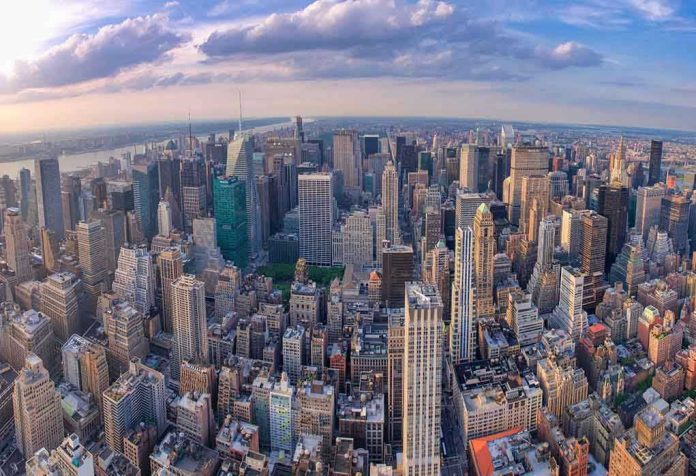
Mandatory facial recognition scans for everyday employees have ignited outrage in New York’s Garment District, exposing how unchecked surveillance technology threatens American privacy and workplace freedoms.
Story Snapshot
- NYC clothing company now requires facial recognition scans for all employees to access the building.
- Outraged staff call the policy invasive and a violation of privacy rights, triggering public protests.
- The controversy highlights growing use of biometric surveillance in U.S. workplaces and its threat to civil liberties.
- Legal experts and privacy advocates warn this sets a dangerous precedent for forced biometric data collection.
Company Imposes Mandatory Facial Recognition on Employees
A prominent clothing company in Manhattan’s historic Garment District triggered a firestorm in August 2025 by enforcing a new security policy: every employee must submit to facial recognition scans to enter work. Unlike security measures targeted at high-risk areas or visitors, this mandate applies universally to staff, regardless of their role, under the stated goal of improving building security. Management claims the move is necessary to address theft and unauthorized access, yet failed to consult employees before rollout, blindsiding the workforce and sparking fierce internal pushback.
Employees immediately voiced concerns, labeling the measure “invasive” and a clear violation of privacy. Protests erupted inside and outside the facility, with workers and advocates denouncing the policy as an unjustified intrusion into personal autonomy. Many staff members worry about how their biometric data will be stored, used, or potentially shared, questioning whether robust safeguards exist against misuse. Some have refused to comply, risking disciplinary action, while others have called for union intervention or legal review to challenge the company’s authority to mandate such surveillance.
Legal, Ethical, and Social Tensions Rise
The Garment District, long a center for both fashion innovation and labor activism, now finds itself at the crossroads of a national debate over privacy and employer power. Legal scholars note that while facial recognition technology is spreading rapidly in retail and commercial environments, the United States lacks comprehensive federal regulation to protect workers’ biometric data. Recent actions by the Federal Trade Commission against companies misusing such data underscore the legal gray area. Privacy advocates warn that compelled facial recognition sets a precedent for invasive surveillance, potentially undermining constitutional rights and workplace dignity.
Historically, biometric surveillance in the workplace has been justified for security or efficiency. But critics argue these rationales are often overstated and do not outweigh risks of hacking, misuse, or mission creep. In response to growing concerns, the broader “privacy fashion” movement is gaining traction, with designers creating clothing and accessories to thwart facial recognition systems—a sign of public resistance to unchecked monitoring. Still, most employees have little recourse against mandatory scanning except through protest, legal action, or seeking new work.
Broader Implications: Erosion of Rights and Industry Precedent
The company’s stance—backed by technology vendors eager to expand their market—has created a showdown with employees and advocates demanding respect for basic rights. Short-term, morale has plummeted and the risk of work stoppages or resignations looms. Long-term, experts warn this case could set a precedent for widespread biometric surveillance across fashion, manufacturing, and beyond, unless lawmakers or regulators intervene. The controversy may prompt new privacy legislation, industry-wide guidelines, or even accelerate the adoption of anti-surveillance technology by the public.
Exclusive | NYC office blindsides workers by forcing facial recognition scans without warning https://t.co/9SXSnKKTCT
— Unapologetic Fun (@stevewells11) August 9, 2025
For many Americans, especially those valuing individual liberty and limited government, the unchecked adoption of facial recognition in the workplace raises deep concerns. Forced biometric data collection—without consent or transparent safeguards—erodes the fundamental right to privacy and sets a dangerous precedent for employer and government overreach. As debates continue in New York and nationwide, the outcome will shape not only the future of work but also the balance between security and freedom in American society.
Sources:
Hastings Science & Technology Law Journal (2024)







